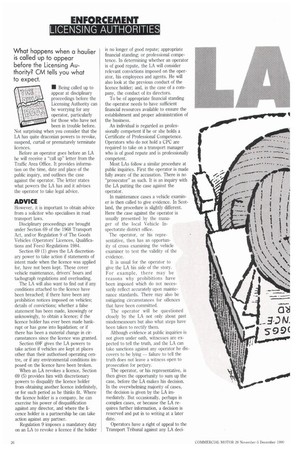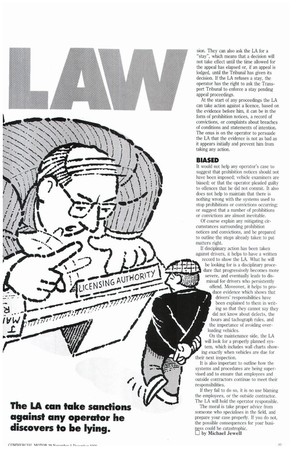What happens when a haulier is called up to appear before the Licensing Authority? CM tells you what to expect.
Page 28

Page 29

If you've noticed an error in this article please click here to report it so we can fix it.
• Being railed up to appear at disciplinary proceedings before the Licensing Authority can be worrying for any operator, particularly for those who have not been in trouble before. Not surprising when you consider that the LA has quite draconian powers to revoke, suspend, curtail or prematurely terminate licences.
Before an operator goes before an LA he will receive a "call up" letter from the Traffic Area Office. It provides information on the time, date and place of the public inquiry, and outlines the case against the operator. The letter states what powers the LA has and it advises the operator to take legal advice.
ADVICE
However, it is important to obtain advice from a solicitor who specialises in road transport laws.
Disciplinary proceedings are brought under Section 69 of the 1968 Transport Act, and/or Regulation 9 of The Goods Vehicles (Operators' Licences, Qualifications and Fees) Regulations 1984.
Section 69 (1) gives the LA discretionary power to take action if statements of intent made when the licence was applied for, have not been kept These cover vehicle maintenance, drivers' hours and tachograph regulations and overloading.
The LA will also want to find out if any conditions attached to the licence have been breached; if there have been any prohibition notices imposed on vehicles; details of convictions; whether a false statement has been made, knowingly or unknowingly, to obtain a licence; if the licence holder has ever been made bankrupt or has gone into liquidation; or if there has been a material change in circumstances since the licence was granted.
Section 69F gives the LA powers to take action if vehicles are kept at places other than their authorised operating centre, or if any environmental conditions imposed on the licence have been broken.
When an LA revokes a licence, Section 69 (5) provides him with discretionary powers to disqualify the licence holder from obtaining another licence indefinitely, or for such period as he thinks fit. Where the licence holder is a company, he can exercise his power of disqualification against any director, and where the licence holder is a partnership he can take action against any partner.
Regulation 9 imposes a mandatory duty on an LA to revoke a licence if the bolder is no longer of good repute; appropriate financial standing; or professional competence. In determining whether an operator is of good repute, the LA will consider relevant convictions imposed on the operator, his employees and agents. He will also look at the previous conduct of the licence holder; and, in the case of a company, the conduct of its directors.
To be of appropriate financial standing the operator needs to have sufficient financial resources available to ensure the establishment and proper administration of the business.
An individual is regarded as professionally competent if he or she holds a Certificate of Professional Competence. Operators who do not hold a CPC are required to take on a transport manager who is of good repute and is professionally competent.
Most LAs follow a similar procedure at public inquiries. First the operator is made fully aware of the accusation. There is no "prosecutor" as such. It is an inquiry with the LA putting the case against the operator.
In maintenance cases a vehicle examiner is then called to give evidence. In Scotland, the procedure is slightly different. Here the case against the operator is usually presented by the manager of the local Vehicle Inspectorate district office.
The operator, or his repre sentative, then has an opportunity of cross examining the vehicle examiner to test the validity of the evidence.
It is usual for the operator to give the LA his side of the story. For example, there may be reasons why prohibitions have been imposed which do not necessarily reflect accurately upon maintenance standards. There may also be mitigating circumstances for offences that have been committed.
The operator will be questioned closely by the LA not only about past misdemeanours but also what steps have been taken to rectify them.
Although evidence at public inquiries is not given under oath, witnesses are expected to tell the truth, and the LA can take sanctions against any operator he discovers to be lying — failure to tell the truth does not leave a witness open to prosecution for perjury.
The operator, or his representative, is then given the opportunity to sum up the case, before the LA makes his decision. In the overwhelming majority of cases, the decision is given by the LA immediately. But occasionally, perhaps in complex cases, or because the LA requires further information, a decision is reserved and put in to writing at a later date.
Operators have a right of appeal to the Transport Tribunal against any LA deci sion. They can also ask the LA for a "stay", which means that a decision will not take effect until the time allowed for the appeal has elapsed or, if an appeal is lodged, until the Tribunal has given its decision. If the LA refuses a stay, the operator has the right to ask the Transport Tribunal to enforce a stay pending appeal proceedings.
At the start of any proceedings the LA can take action against a licence, based on the evidence before him, it can be in the form of prohibition notices, a record of convictions, or complaints about breaches of conditions and statements of intention. The onus is on the operator to persuade the LA that the evidence is not as bad as it appears initially and prevent him from taking any action.
BIASED
It would not help any operator's case to suggest that prohibition notices should not have been imposed; vehicle examiners are biased; or that the operator pleaded guilty to offences that he did not commit. It also does not help to maintain that there is nothing wrong with the systems used to stop prohibitions or convictions occurring; or suggest that a number of prohibitions or convictions are almost inevitable.
Of course explain any mitigating circumstances surrounding prohibition notices and convictions, and be prepared to outline the steps already taken to put matters right.
If disciplinary action has been taken against drivers, it helps to have a written record to show the LA. What he will be looking for is a disciplinary procedure that progressively becomes more severe, and eventually leads to dismissal for drivers who persistently offend. Moveover, it helps to produce evidence which shows that drivers' responsibilities have been explained to them in writing so that they cannot say they did not know about defects, the hours and tachograph rules, and the importance of avoiding overloading vehicles.
On the maintenance side, the LA will look for a properly planned system, which includes wall charts showing exactly when vehicles are due for their next inspection.
It is also important to outline how the systems and procedures are being supervised and to ensure that employees and outside contractors continue to meet their responsibilities.
If they fail to do so, it is no use blaming the employees, or the outside contractor. The LA will hold the operator responsible.
The moral is take proper advice from someone who specialises in the field, and prepare your case properly. If you do not, the possible consequences for your business could be catastrophic.
E by Michael Jewell












































































